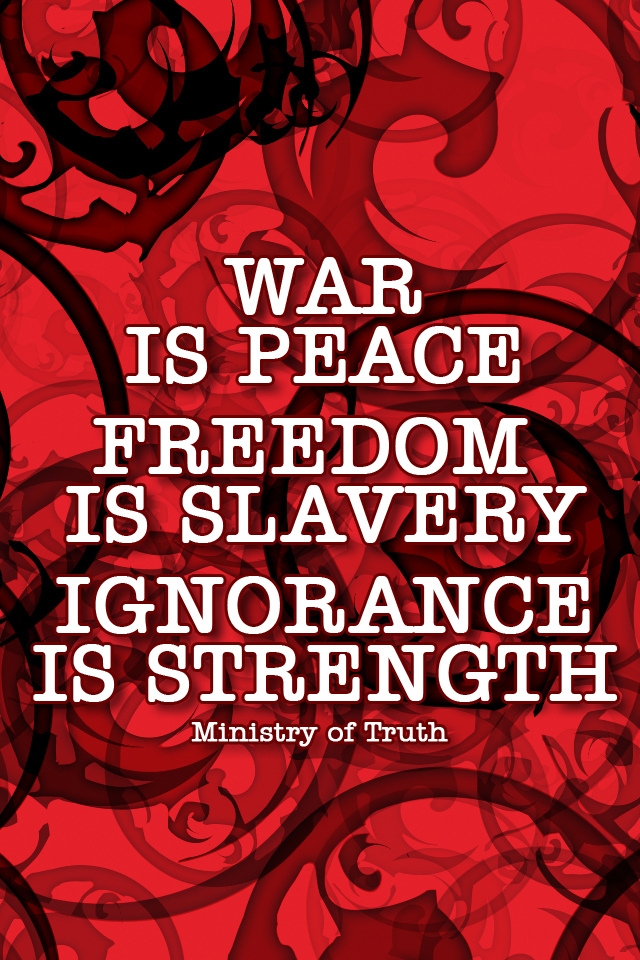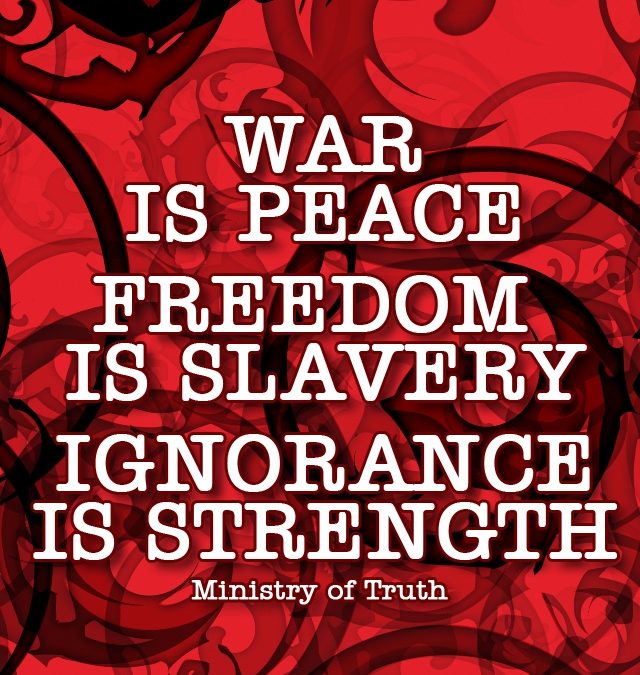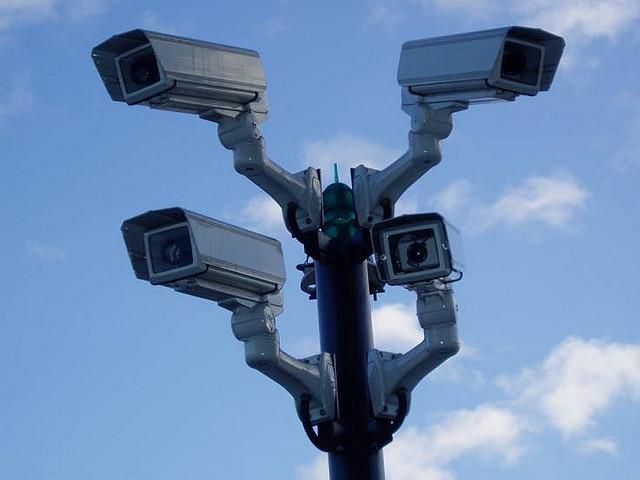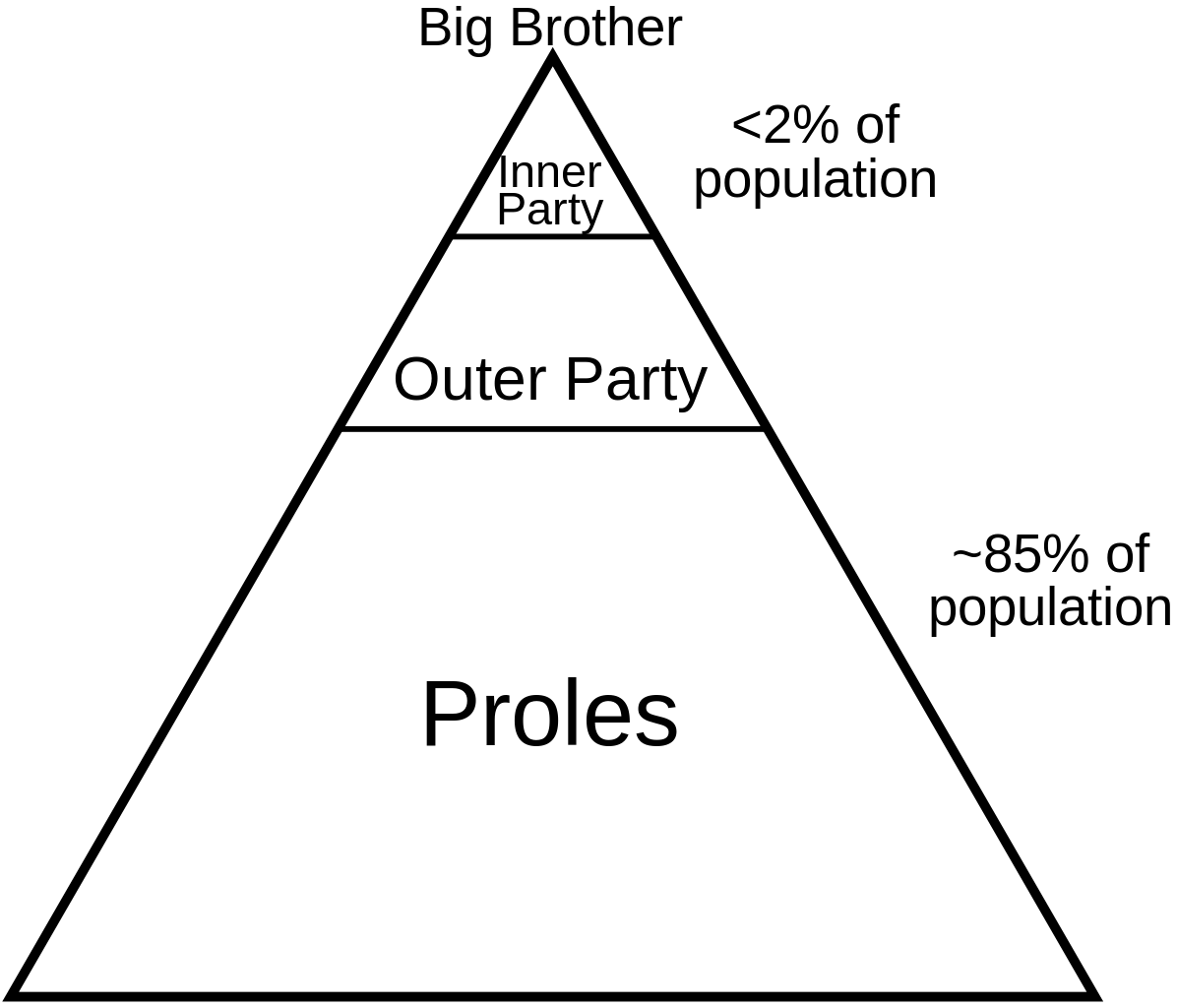
The novel 1984 is a classic written by George Orwell, the author of Animal Farm. If you are looking for books about totalitarianism, mind-control, and the twisting of language to keep people stupid and under control, then these two books are for you.
Since Orwell was British, he wrote with British English, which you will often find in 1984. (flat = apartment; spanner = wrench, lorry = truck). Orwell wrote the novel in 1948, when memories of WW II and Nazism were still painfully fresh, Joseph Stalin oversaw a totalitarian state in the USSR, and the Cold War was heating up.The book was published in 1949 (the same year the Berlin Airlift ended, Germany was officially split into East and West, the USSR tested its first atomic bomb, and Mao Zedong made China communist). We believe Orwell got the title from twiddling the numbers from the year of his authorship: 1948. The main character is Winston Smith, a bright man who is suffocated by the oppression and stupidity all around him. He is haunted by the question: Have things always been this bad? It’s set in London, on Airstrip One (England), part of a totalitarian state (Oceana) that includes North America. “Utopia” means “a perfect place,” so 1984 is a dystopian novel, a scary book about a terrifying place in a horrifying future. There is constant war, lying, propaganda, and shortages. A hallmark of Orwell’s is his ability to show how people can twist and manipulate language to control people and their thinking. In this book, the Ministry of Peace oversees War, the Ministry of Plenty oversees famine and shortage, the Ministry of Truth (where Winston works) oversees propaganda and the rewriting of history, and the Ministry of Love is where the state conducts torture. The book is so powerfully written, several words and phrases that Orwell created here have found permanent places in the English language: Big Brother, Big Brother is watching you, thoughtcrime, Thought Police, unperson, newspeak, doublethink, 2 + 2 = 5, telescreen, and memory hole. Even Orwellian has become an adjective, meaning “an insane, frightening situation marked by absolute control and absurdity.”
(Speaking of “newspeak,” Orwell’s classic essay “Politics and the English language” goes into further detail about how English words and phrases can be twisted by linguistically-clever people to manipulate and mislead people. Take a look.)
This has long been one of my favorite books, and I had often heard mention made of it while growing up. When Christmas break 1983 at William and Mary was approaching, I stopped by the library right after exams and before going home, so I could get a copy of the book to read as the world entered the year 1984. During the Summer of 1984 (ironically), I had the opportunity to join a Christian choir that traveled behind the infamous Iron Curtain and we gave performances in Czechoslovakia, Hungary, and Yugoslavia. In an irony that Orwell would appreciate, two of those three countries no longer exist (having broken into smaller countries). Later I had the opportunity to travel to other Marxist countries, including East Germany, the USSR, Bulgaria, Romania, China, and Vietnam. Traveling in those communist countries, especially the more politically-rigid ones, showed me many comparisons to the novel. One Sunday afternoon I had had lunch with an older man in Eastern Czechoslovakia. He spoke no English, and I spoke no Czech, but we could both communicate in German, which he had learned under the Nazi occupation of WW II. (A good example of the importance of learning foreign languages!) He explained the daily indignities of living under communism. He pointed to a green bottle on the table. “What color is the bottle?” he asked me. “Grün” [green] I replied. He responded: “You know it’s green, I know it’s green, but if the Party says it’s yellow, we have to say “it’s yellow.” As a humanities teacher, I have often assigned or encouraged my students to read both Animal Farm and 1984 (usually in that order). During the years I had the pleasure of teaching the elective class I had envisioned and created, “20th Century European Totalitarianism,” this was required reading. I co-wrote this packet in 2004, and am pleased to now be able to share it on my blog with a wider audience, with some updating for 2015. Sadly, over the eleven years since I wrote this packet, I have observed more “Orwellian” trends around the world, including here in my native country of the USA. But don’t take my word for it. Read 1984 for yourself, keep an eye on the daily news, and make your own connections and come to your own conclusions. Source and to learn more: click here
Part One, Ch. I
Vocab: meagerness sanguine
- Read the first paragraph only. What impression does it give you? How
- What are the 3 slogans of the Party? What impression do they give you about this place?
- Why is Winston afraid to write in a journal?
Part One, Ch. II
Vocab: flat (noun–British) spanner (British) = wrench (American) unorthodoxy (the stem “ortho” means “straight,” [as in “orthodontist”] and “doxy” means “teaching or belief” [as in “paradox”]) As I love to tell my students, “vocabulary is everywhere,” and once you learn a new word, you often see or hear it used. Check this news article from January 2017, the first week of the Trump presidency. What vocabulary word to you see in the second paragraph? 4. Who was Mr. Parsons, how does Orwell describe him, and why does “the stability of the Party” depend on people like him? 5. Describe the Parsons’ children and their behavior. Writing Workshop: One of my favorite passages in this book is the beginning of this chapter, where Orwell describes Winston’s neighbors, Mr. and Mrs. Parsons and their children. What are some examples of description, word choice, imagery, punctuation, etc. that Orwell uses to create this vivid scene? How does he use dialogue and thought-shots in this passage to make his points? How does he engage four of the five senses with his words?
- smell?
- sight?
- hearing?
- feeling/touching?
Connecting Literature to Current Events: This passage about the Parsons’ family refers to the “Youth League and the Spies,” and claims how “Nearly all children nowadays were horrible.” Orwell explains: [H]ardly a week passed in which the Times did not carry a paragraph describing how some eavesdropping little sneak–“child hero” was the phrase generally used–had overheard some compromising remark and denounced his parents to the Thought Police.” In this recent link, who are the “criminals”? What does the website urge its visitors to do? How is this website similar to the 1984 idea of “Little Spies” and “Thought Police”? How is it different? This link disagrees with the above link. How does this author use emotional language to “stir up” his readers?
Part One, Ch. III
- What do Winston’s dreams tell us?
- What is doublethink?
This story is about a high school girl in Boston, Massachuestts (USA), head cheerleader, who was kicked off her cheer squad. Why? She was following her teacher’s assignment to watch a US presidential debate and engage in a conversation on Twitter about it. According to the article, someone was “offended” by her comments, the student was punished, and the school is creating “a curriculum about diversity and acceptance.” An online student of mine, in Taiwan, has been studying 1984 and read this article today. When I asked her if she saw any 1984-ideas in the news story, she responded with: thoughtcrime, newspeak,and doublethink. When I further asked, “How does this show doublethink?” she answered: “You say you want acceptance, but you don’t accept other people.” Can you think of any more 1984-style ideas or themes present in this news story?
Part One, Ch. IV
- What is Winston’s job?
- What countries do you think Orwell had in mind when he wrote 1984?
This map shows the fictious world of “1984,” where the world was divided among Oceania, Eurasia, and Eastasia
Part One, Ch. V
Vocab.: Queue (p. 43)
- How does Orwell make such a graphic description of the cafeteria? Give examples.
- Why is the Party so concerned about language? What is the Party trying to do?
- Does this chapter make you feel differently about learning vocabulary? How?
- What is facecrime? What’s happening to Parson’s children? What do you guess might happen?
Connecting Literature to Current Events: Probably most readers are aware that the US has a major problem with gun violence, a crisis, even. Many people are struggling to find reasons for the epidemic of violence and, more importantly, how to stop it. So as a part of this national conversation I recently found this op-ed piece written by Paul Winistorfer, a dean at Virginia Tech and published in the Roanoke Times. Tragically, Virginia Tech was the site of a horrific massacre in 2007 when a crazed student killed 32 persons, including a professor who had survived Hitler’s holocaust as a child. DreyerCoaching.com is based in nearby Roanoke, Virginia, so the killing was a hometown tragedy for us all here. In all honesty, of course we need to be careful with our language and mindful of those who have suffered from tragedy. Also, it is natural that the author of this op-ed piece, as an employee at Virginia Tech, would have that horrific backdrop influence his thinking. However, his article raises some important questions. You can read his essay here, and then please answer these questions.
- What is a euphemism? (Note: the stem eu- means “good”)
- What is an idiom?
- Are sayings like “shoot yourself in the foot” or “silver bullet” euphemisms or idioms? What does this tell you about the article’s title and article itself?
- Pick 3 of these sayings that the author finds offensive, and explain what they mean in plain English.
- Can you think of any other “gun or bullet” sayings in English that are not on the list in this article?
- Do you think reducing or banning the use of these phrases or sayings will help reduce gun violence in America? Why or why not?
- Do you see any connection between this opinion piece, and 1984? Especially this chapter?
Part One, Ch. VI, VII
Vocab.: Fornication (p. 56) Tacitly (p. 57) Debauchery (p. 57) Capitalist (p. 63) Defection (p. 65)
- What is the Party’s view toward sex? Why?
- According to Winston, what one group holds the hope for a better future? Why?
- What bias do you see in the school textbook excerpt?
- Looking at Jones, Aaronson, and Rutherford, Winston hears a song:
“Under the spreading chestnut tree/ I sold you and you sold me.” What might make someone betray someone else?
- According to Orwell, what is the definition of freedom?
Think & Write: Think of modern culture in the USA, or elsewhere in the West, or East Asia. Are there “proles” today? If so, where do you find them? What do they think about? How do they entertain themselves? What power would they have, if they took advantage of it? Find a recent news article that relates to this and “connect the dots” to proles and 1984.
Part One, Ch. VIII
Vocab.: Labyrinth (p. 70) Strident (p. 71)
- What one thing truly interested the proles? Can you think of any parallels in modern-day America?
- What risk did Winston take by entering a pub? Did Winston get the information he was looking for?
- Why is Winston fascinated by the past?
1984 Social Classes. Proles were 85% of the population, but the top 2% controlled everyone else.[/caption]
Part Two, Ch. I, II
Vocab.: Lavatory (p.88) Incredulity (p. 100) Black Market (p. 101)
- The elaborate plans to meet somebody evoke the oppressive atmosphere. What details add to this feeling?
- What was unusual about the chocolate Julia had?
- What group does Julia belong to and do volunteer work for? What’s the irony?
Part Two, Ch. III, IV
Vocab.: Rendezvous (p. 107) Kilo = kilogram (p. 117)
- Winston describes his wife, Katherine, as “naturally orthodox.” What was the Newspeak word for that?
- Winston thought that there was “a direct, intimate connection between chastity and political orthodoxy.” How so?
- In addition to blocking sexual urges and perverting them into “fear, hatred, and lunatic credulity,” what else has the Party perverted to increase its power?
- What is the difference between Julia’s reaction to the rat and Winston’s?
- Why is Winston so interested in the nursery rhyme?
- Winston and Julia do not try to escape or break off the relationship. Why do some people stay in dangerous relationships or places?
What imagery and examples does Orwell use in this chapter to show how life has changed in England (Airstrip One) over their lifetimes? Does Orwell show the changes to be good or bad?
Part Two, Ch. V, VI
Vocab.: Embellish (p. 123) Palpable (p. 125) Invincible (p. 127)
- What two facts showed that Syme had ceased to exist?
- Who does Winston finally get a chance to talk with?
Connecting Literature to Current Events: Quentin Letts, a journalist for the BBC, on Dec. 10, 2015 published an article in the Daily Mail explaining how he had been punished for producing a show that poked fun at the Global Warming theory. The “offensive” program he had created was also deleted from the BBC archives. In this part of 1984, we learn that Syme had “vanished.” What words and themes from 1984 do we find in Letts’ article? What is Letts’ “hook” to start his essay? Following is the first part of Letts’ story:
“George Orwell devised the word ‘unperson’ to describe someone who had so offended official thought, he or she was vaporised — not just liquidated but wiped from the record for eternity.
That way the unperson couldn’t set a bad example.
All memory of the impertinence would be forgotten, Comrades!
Orwell was satirising Stalin’s Russia, where such practices were all too common.
When a Politburo member called Nikolai Yezhov, People’s Commissar for Water Transport, fell out of favour with Joseph Stalin in 1940, he was not just killed.
A photograph of him beside Stalin in happier days was doctored to remove all trace of the unfortunate Yezhov. It was as though he had never existed.
And he was not the only one.
Though the circumstances are less dramatic, I am at present feeling a few twinges of solidarity with Yezhov.
Earlier this year, I made a jaunty little Radio 4 programme called What’s The Point Of The Met Office?
Last week, after a bizarre and focused lobbying campaign from environmental activists, the programme was removed from the BBC’s iPlayer playback facility.
To adapt Orwell, What’s The Point Of The Met Office? became an un-programme.
One moment it was there, available to licence fee-payers to hear at their convenience. The next? Ker-whack! It disappeared as surely as one of those Islamist-owned oil derricks in Syria snotted by an RAF Paveway missile. Ladies and gentlemen, the Left had struck. I had been censored, expunged, deleted or ‘dealt with’, as RAF types put it.
The experience was baffling rather than upsetting. The programme had only ever been intended as a light summer diversion, yet it was mistaken for some sort of attack on the Establishment’s global warming theory. [….]”
*********************************** Here are the two photographs of Nikolai Yezhov that Letts refers to in his article. Not content to simply have Yezhov executed, Stalin had his very memory obliterated, as we see in this “doctored” photograph. Just think: if Stalin and his henchmen could “rewrite history” by falsifying photographs, with the crude technology of the 1930’s and 40’s, imagine what images can be twisted and manipulated with today’s state-of-the-art photo editing software?
***************************
Part Two, Ch. VII, VIII
Vocab.: Intermittent (p. 133) Superfluous (p. 133) Equivocal (p. 139)
- Winston thinks back to his early childhood. After his father disappeared, how did his mother change?
- What were the events surrounding his mother’s and sister’s disappearance?
- How do the apartments reserved for members of the Inner Party differ from those given to Outer Party members like Winston?
- What is the Brotherhood? Why does Winston think O’Brien is a member?
Part Two, Ch. IX, X
Vocab.: Gelatinous (p. 148) Syntax (p. 150) Irreconcilable (p. 166) Heretical (p. 175) Tenet (p. 176) Indefatigable (p. 180)
- The sections of Goldstein’s book, which Winston reads, are vitally important to understanding Orwell’s meaning. Can you guess what book Orwell is satirizing?
- According to Goldstein’s book, what is the real reason behind constant warfare?
- Why, in your opinion, does Orwell interrupt his story with this long section of political theory?
- What is doublethink?
- What are some of the main ways Party members are taught to control disloyal thoughts?
- What does the destruction of the paperweight suggest or symbolize?
- What would be a good title for Part Two, Ch. X?
Part Three, Ch. I, II
Vocab.: Copiously (p. 188) Pedant (p. 191) Servile (p. 192) Sanctimonious (p. 192) Truncheon (p. 193) Eradicate (p. 209) Unrepentant (p. 209)
- What Ministry does Winston believe he is in?
- The majority of the prisoners Winston was with were c_________ criminals, but a few were p_______ prisoners. How do the two groups of criminals behave differently?
- What’s ironic about the older woman sitting next to Winston? Why do you think Orwell put this part into his book?
- How does this scene build suspense?
- Why is Ampleforth imprisoned? Do you see any similarities or parallels in America today?
- How does Orwell use words to describe the prisoners in the cell? Pick one example you especially like; why do you like that description?
- “Who controls the past controls the future; who controls the present controls the past.” What does this mean???
- O’Brien said: “But I tell you, Winston, that reality is not __________. ________ exists in the __________ ________, and nowhere else. Whatever the ________ holds to be ________ is _______.” What does this mean???
- Why does O’Brien torture Winston to make him see five fingers where only four exist?
- What is the Party’s ultimate goal?
Part Three, Ch. III, IV
Vocab: Reintegration (p. 215) Malignant (p. 224)
- What does Winston’s rotting body represent?
- Orwell writes: “It was like swimming against a current that swept you backwards however hard you struggled, and then suddenly deciding to turn round and go with the current instead of opposing it. Nothing had changed except your own attitude.” (Under GOD IS POWER, p. 228-229) What does this mean?
- What room was Winston finally sent to?
Part Three, Ch. V, VI
Vocab.: Didactically (p. 236)
- What does Winston finally do, in Room 101, regarding Julia? Why?
- What does Winston writing on the café’s table symbolize?
- What happens to Winston in the end?
- Can human nature be changed in such a way that people will forget their longing for freedom, dignity, integrity, and love? Can people forget that they are human?
- Try to imagine twenty years into the future. What one key lesson, memory or idea will you keep with you from 1984? Why?



